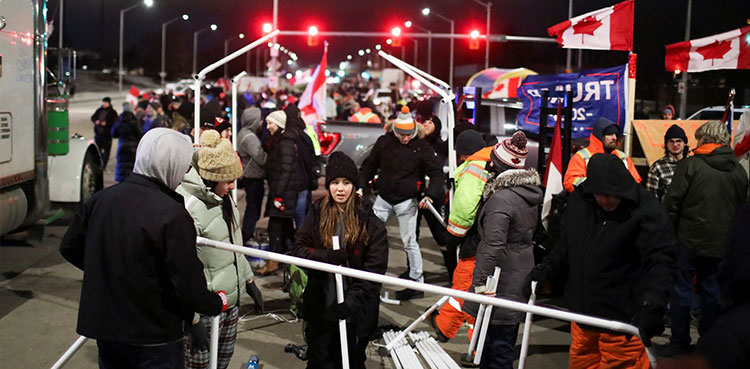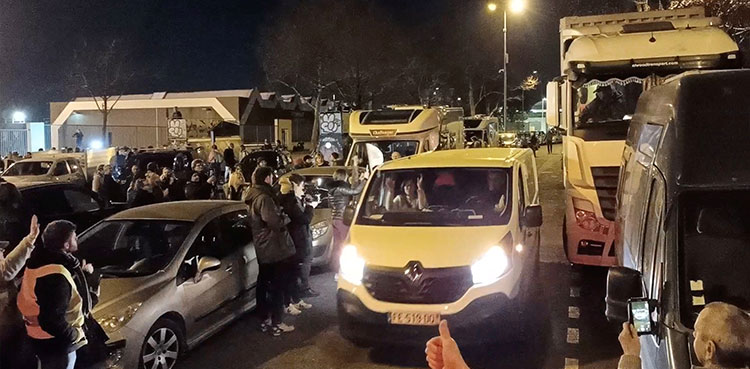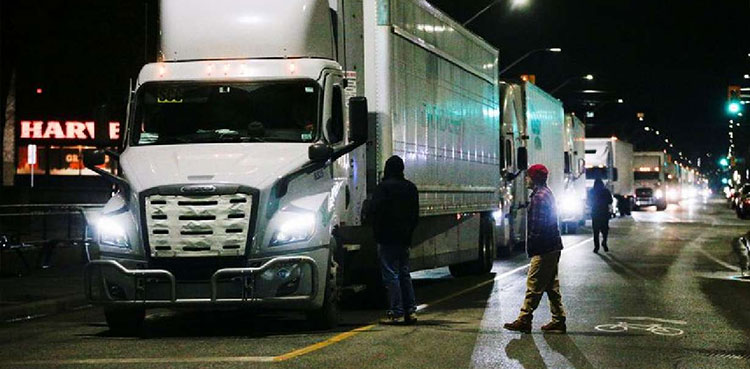
WINDSOR, Ontario/OTTAWA/WASHINGTON: Canada’s Ontario province declared a state of emergency on Friday and threatened to fine and jail protesters who have been blocking a key U.S. trade corridor for four days, damaging auto production and drawing calls for action from the White House.
Truckers angered by coronavirus mandates began occupying Canada’s capital of Ottawa last month before crowding dozens of vehicles near Ontario’s Ambassador Bridge, North America’s busiest land border crossing and a choke point for Detroit’s carmakers.
Officials are diverting cargo to stem losses after cuts by Ford Motor Co, General Motors Co, Chrysler parent Stellantis and Toyota Motor Corp. Ontario, where police have avoided using force to disperse protesters, sought to build pressure by threatening C$100,000 fines and up to a year in prison for non-compliance.

Announcing the penalties on Friday as part of emergency measures, Ontario Premier Doug Ford said they were needed to “make crystal clear it is illegal and punishable to block and impede the movement of goods, people and services along critical infrastructure.”
Ford said Freedom Convoy protesters had “attempted to disrupt our way of life by targeting our lifeline for food, fuel and goods across our borders,” and that they were “trying to force a political agenda through disruption, intimidation and chaos.”
It was not immediately clear if and when authorities would begin issuing fines or seeking jail sentences. A Canadian mayor whose city abuts the bridge sought a court injunction physically removed on Thursday to have the protesters removed.
The “Freedom Convoy” protest, launched by Canadian truckers opposing a vaccinate-or-quarantine mandate for cross-border drivers, is also occupying areas outside government buildings in Ottawa and has blocked two smaller U.S. crossings.

The protest has inspired similar convoys and plans in France, New Zealand, Australia and the United States, whose Department of Homeland Security is working to ensure a “Freedom Convoy” event due in early March in Washington, D.C., “does not disrupt lawful trade”.
U.S. PRESSURE, AUTO CUTS
U.S. President Joe Biden’s administration has urged Canada to use federal powers to ease the Ambassador Bridge blockade, a step Prime Minister Justin Trudeau’s government has not taken.
Calls for action piled up on Friday from Ford, which warned of a widespread impact on all automakers in both nations, and the governor of Michigan, home to nearly a fifth of all U.S. car production.
“The Canadian government has to do whatever it takes to safely and swiftly resolve this,” Governor Gretchen Whitmer told CNN.
The stock of Canadian autoparts maker Magna International fell 4.4% on Friday after it said it had seen an initial hit from the bridge’s closure.
Ford, the second-largest U.S. automaker, said on Friday it had temporarily halted production at its assembly plant in Ohio.
General Motors and Toyota also announced new production cuts.
Trudeau says he is working with municipal leaders to end the blockade. His intergovernmental affairs minister, Dominic LeBlanc, said Canada has been “very engaged” with its U.S. partners over the crisis.
“Just because somebody doesn’t agree with a particular public-health measure doesn’t entitle them to damage hundreds of millions of dollars of cross-border trade, or create enormous disruption and abuse on the streets of the nation’s capital,” LeBlanc told reporters.
Public Safety Minister Marco Mendicino said federal police had deployed additional units to Ottawa, where officers have made 25 arrests so far. Mendicino was scheduled to speak with U.S. Homeland Security Secretary Alejandro Mayorkas on Friday, his office said.
from International News Today - Breaking News, US News, World News https://ift.tt/59LPjh7


0 Comments